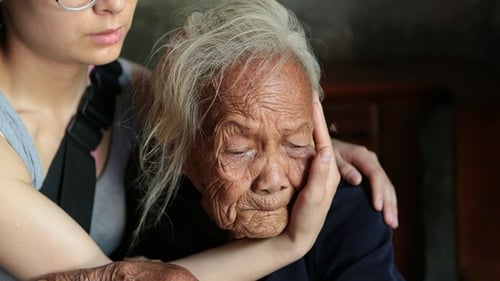SMOKE (2009)
Género : Drama
Tiempo de ejecución : 22M
Director : Kuan Guo
Sinopsis
Tian Yuan and Da Bing were brothers who had been in contact for many years. They gradually alienated but at the same time fell in love with a girl who dances like a nightclub. In the entanglement of love and brotherhood, youth ends in a group fight for their love. . Love and hatred, like smoke, silk, and thread, became the past...

Follow the lives of the elderly survivors who were forced into sex slavery as “Comfort Women” by the Japanese during World War II. At the time of filming, only 22 of these women were still alive to tell their story. Through their own personal histories and perspectives, they tell a tale that should never be forgotten to generations unaware of the brutalization that occurred.

It has been a month Chang's wife Ling Yue has been missing. With no reasons one fine day she went to work as usual and then never returns. No one knows where she went or what had happened to her. Chang could not figure out why she disappears out of the sudden. She left no message of whatever kind or clues. One day a man named Tong shows up and claims to be Ling Yues lover. Apparently Tong is looking for Ling Yue too. In a turn of event both men formed an uneasy alliance in order to find Ling Yue

Xuan is a young man working in the film industry in Beijing. To make a documentary film that he wants to present at international festivals, he decides to take advantage of the holidays of the Day of the Dead to return to Chengdu, his hometown located at the other end of the country. The documentary he is about to make is about his relationship with his own lover. He leaves for Chengdu, accompanied by another man, Bo, the cameraman of the film. The two men take the train to Chengdu where Hong, Xuan's lover, is waiting for them. From the first moment of their arrival at the station, Xuan and Bo begin to turn with their camera, Xuan having already explained to Bo what he wanted to film and that Hong would always be "playing", Bo then trusting in Xuan. But Hong is more and more opposed to this camera and the presence of Bo.

The relationship between two young men in Beijing becomes strained after one of them develops an unusual fetish.

The movie follows two unfortunate secret lovers who are constantly looking for a solution to their situation. Both of them are always arguing over their relationship. One day they went to a trip out of the city, into the outskirt. They hope they can solve their problems or at least escape them temporarily. They don’t have a solution, and they don’t understand why they are together. One thing that keeps them together is their love and care for each other. This is the second part of James Lee’s Love Trilogy which takes another look at unfaithfulness or rather faithlessness.

"If It's Not Now, Then When?" sobre todo desarrolla en un apartamento habitado por tres miembros de una familia (aunque no al mismo tiempo): la madre, Pearlly Chua, la hija Bee Tan Hung y el joven hijo Kenny Gan. Su padre parece haber muerto recientemente. La madre se va temprano y regresa tarde, sale a dar largos paseos por el parque con un amante a quien la hija y su mejor amiga tratan de espiar. La hija trabaja lejos y tiene un romance inconexo con su jefe, que está casado, que se lleva a cabo entre su negocio y las llamadas telefónicas de la familia. Y el hijo se rompe en autos y "recicla" la electrónica que se encuentra.

This film cross-cut the "Odessa Steps" chapter from the famous war movie "Battleship Potemkin" (1925) and the actual footage of the Russo-Ukrainian conflict in 2022. It uses a 21st-century "Montage d'Attraction" to explore The circle of history, the contradictions of civilization, and the crisis of life.

Legendary Peking Opera master, Yuling Fang, emigrates to New York where he works in a nail salon. Realizing there is no one to inherit his legendary skills, he decides to mount an amateur production in order to keep alive the vanishing world he loves.

On May 12, 2008 , the biggest earthquake in Chinese history occurred in the film maker's hometown of Wenchuan. According to official polls, 69,159 were killed, 374,141 were seriously injured and 17,469 are still considered to be missing. The film maker's parents, central character in the film, are survivors. In a surreal hybrid of documentary footage, experimental abstraction and fictional elements, "On the Way to the Sea" studies the human fragility and spiritual homelessness generated by such disasters.

This important, patient documentary follows a year in the life of the sidings dwellers who eke out a living, begging, foraging, stealing and sleeping rough near the Baoji railway station in Shaanxi.

In 1946, Heidi is entrusted to a Swiss family by her father. He will never come back for her. Today, François Yang questions his mother about her past. What follows is a journey to China, a quest to reconstruct memory. Through contact with her brothers and sister, Heidi measures the extent of the drama experienced by her family that remained in China, persecuted by the Communist Party.

The film records a long journey by Guo Kuan and his friends, as well as a post-cycling biography. The changes in Dali after one year, and the hurried passing by around. These subtly melt into life, and then there is this instinct documentary that needs to be expressed.

One long tracking shot through a park in Chengdu.

The frustrated painter decided to burn his failed paintings. Unexpectedly, when the paintings burned down, they turned into paper cranes and returned to his memory. As memories shuttled, the painter wanted to recover the waste paper again, but it was too late.

Filmed over three years on China’s railways, The Iron Ministry traces the vast interiors of a country on the move: flesh and metal, clangs and squeals, light and dark, and language and gesture. Scores of rail journeys come together into one, capturing the thrills and anxieties of social and technological transformation. The Iron Ministry immerses audiences in fleeting relationships and uneasy encounters between humans and machines on what will soon be the world’s largest railway network.

The film is about a real estate intermediary man Wang full face of long-distance love girlfriend and girlfriend of the family pressure, there are a few small contradictions of beipiang roommates, and his heart is a romantic people set yearning rivers and lakes brother. Everyone's attitude to him led to a thick confusion in the face of the world.

The "Great Sichuan Earthquake" took place at 14:28 on May 12, 2008. In the days after, ordinary people salvage destroyed pig farms in the mountains, collect cheap scrapped metals, or pillaging other victims' homes. Behind the media circus of official visits is an inconsolable grief of families searching for loved ones. As the Lunar New Year approaches, vagabonds and family tell of the ill-handling of rebuilding schemes and misuse relief funds. As they prepare for another visit from a high official, the refugees are swept out of the town and into tent cities. The promise to put a roof over their heads before winter seems impossible to keep.

Set in a quasi-ghost town that once thrived with oil in China's arid northwest, Yumen is a haunting, fragmented tale of hungry souls, restless youth, a wandering artist and a lonely woman, all searching for human connection among the town's crumbling landscape. One part "ruin porn", one part "ghost story”, and entirely shot on 16mm, the film brings together performance art, narrative gesture, and social realism not only to play with convention and defy genre, but also to pay homage to a disappearing life-world and a fading medium.

Documentary about a tribe of indigenous people in northern China.








